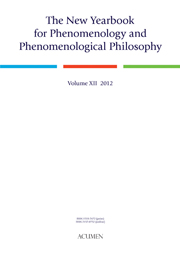Book contents
- Frontmatter
- Contents
- Articles
- Documents
- Edmund Husserl's Philosophy of Arithmetic in Reviews
- “The Logical and Historical Element in Hegel's Philosophy”: Inaugural Dissertation for the attainment of the Degree of Doctor of the Philosophical Faculty at the University of Marburg
- The Work of Philosophy
- In Review
The Work of Philosophy
from Documents
- Frontmatter
- Contents
- Articles
- Documents
- Edmund Husserl's Philosophy of Arithmetic in Reviews
- “The Logical and Historical Element in Hegel's Philosophy”: Inaugural Dissertation for the attainment of the Degree of Doctor of the Philosophical Faculty at the University of Marburg
- The Work of Philosophy
- In Review
Summary
Abstract: Winthrop Pickard Bell studied with Edmund Husserl in Göttingen during 1911—4. During the war he was interned in Ruhleben prison camp, where he gave several public lectures to fellow prisoners. The 1915 lecture entitled “The Work of Philosophy” was given to a general audience and has an introductory character. It articulates a conception of philosophy based upon Husserl's Göttingen period in two senses. First, unlike several of Husserl's other students at the time, he fully accepted the transcendental reduction as the basis of a scientific conception of philosophy. Second, Bell furthered Husserl's Göttingen emphasis on grounding the cultural sciences through his own work on the phenomenology of value.
Keywords: Winthrop Pickard Bell; Husserl
Editor's Preface
Winthrop Pickard Bell was born in Halifax, Nova Scotia, Canada in 1884 and studied with Edmund Husserl in Göttingen during 1911—14. During the war he was interned in Ruhleben prison camp where he gave several single lectures, including the one presented here, as well as a series on the Philosophy of Value—which remained the major topic of his philosophical interest. Later, Bell taught at Harvard University (1922—7) where he introduced Dorion Cairns to phenomenology. His Harvard courses were likely the first courses taught in North America on Husserl and phenomenology. Bell's presence among Husserl's students, as well as his dissertation on Josiah Royce (defended 1914), have been noted in several histories of phenomenology, but very little is known of his philosophical work.
- Type
- Chapter
- Information
- Publisher: Acumen PublishingPrint publication year: 2013



